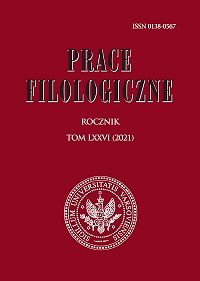Dzieje i znaczenia współczesne słów własny i właśnie w świetle ich powiązań etymologicznych
The History and Current Meanings of the Words Własny and Właśnie in the Light of Their Etymological Interrelations
Author(s): Renata GrzegorczykowaSubject(s): Lexis, Semantics, Historical Linguistics, Western Slavic Languages
Published by: Wydział Polonistyki Uniwersytetu Warszawskiego
Keywords: Polish language history; etymology; semantics; historical semantics; possessivity; particle; pronoun swój;
Summary/Abstract: The paper presents the history and the current state of the Polish words własny and właśnie. They originate from the Proto-Slavic *vold-ti ‘to reign, to rule’ and *voldtь (>*volstь) ‘power’, as continuants of the PIE etymon *u̯al- ‘strong, to prevail’. The original meaning of the adjective własny ‘to surrender, to yield to power’, ‘being subjected to sb’s rule’ evolved towards possessivity (‘possessed by sb’): własny komuś ‘belonging to this person’. After a Middle-Polish period of semantic instability, the adjective acquired a stable meaning ‘belonging to a given subject’, ‘connected with a given subject’ (only occasionally – with an object designated by other nominal phrase). e.g. X ma własny dom (‘X has got their own house’), X ma własny pomysł (‘X has got their own ideas’). In this respect, własny resembles the pronoun swój, although the two lexical items are by no means identical. Właśniein turn, originally a gradable (właśniej) adverb meaning ‘exactly, precisely’ (e.g. właśnie mówiąc ‘precisely speaking’), after a Middle-Polish period of inconsistency, has evolved into an epistemic confirmatory particle meaning ‘indeed’, ‘really’, ‘truly’, cf. e.g. a quote from Stanisław Wyspiański’s “Wesele”: A to Polska właśnie (‘And this is what Poland is’).
Journal: Prace Filologiczne
- Issue Year: 76/2021
- Issue No: 1
- Page Range: 173-184
- Page Count: 12
- Language: Polish

